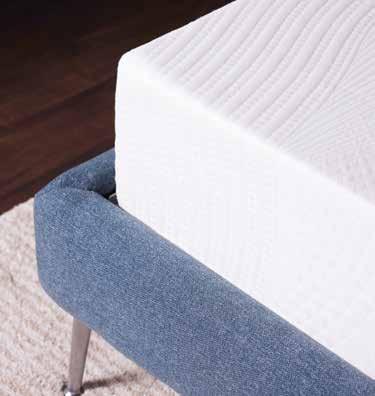& Wellness
Q&A WITH DR. MEGAN ROSSI Tips for a Healthier Gut and Immune System
Dr Megan Rossi, PhD, Rd, APD is an award-winning gut health scientist, dietitian, nutritionist, and bestselling author with a mission to inspire and transform everyone’s gut health using the latest science.
What are the links between our digestive and immune health?
We know that around 70 per cent of your immune cells live in the gut. The gut and immune system are in constant communication through the gut-immune axis, which is why people with better gut health seem to have more resilient immune systems. This caught the
attention of the general public during the COVID-19 pandemic, as those who had more diverse microbiomes experienced a lower risk of serious illness and better recovery if they contracted the virus. Meanwhile, research has also shown that gut diversity is linked to fewer or milder cold and flu contractions too, as well as broader beneficial health factors.

3 Tips for Respiratory Protection
Ontario residents can take charge of their respiratory well-being with a simple trip to their local pharmacy.
Arthur Catapano RPh, BSc, PharmD & Michelle Liang, RPh, BSc, PharmD
Ontario pharmacies are essential allies in the pursuit of respiratory wellness. Here’s how pharmacy professionals can help to safeguard your respiratory health.
Tip 1: Be vaccine vigilant With a variety of respiratory illnesses circulating, including influenza, COVID19, and RSV, being proactive about your health is key. Vaccines provide a safe and effective way to stimulate your immune system and reduce the risk of death or health complications from common infectious diseases.
Pharmacy professionals provide convenient access to vaccines and professional guidance, empowering patients to take control of their health. In fact, this past year alone, a majority
of Canadian adults (52 per cent of the vaccinated population) received their vaccines at a pharmacy.
Here are four essential vaccines your Ontario pharmacy can administer: Influenza vaccines COVID-19 vaccines
• RSV (respiratory syncytial virus) vaccines Pneumococcal vaccines
Tip 2: Harness the power of pharmacist prescribing Pharmacist prescribing is a potent tool to treat certain respiratory conditions and prevent severe outcomes in patients. Additionally, Ontario pharmacists are expertly trained to prescribe, counsel, and provide resources for smoking cessation, which can significantly
A Good Gut Feeling: How to Stay Healthy and Boost Immunity


One cannot underestimate the importance of gut health. Home to the body’s microbiome that possesses trillions of bacteria, it is responsible for hormone regulation, stress management, and a lot more.
“What a lot of people don’t know is that 70 to 80 per cent of their body’s immune system is actually in the gut,” says Bisleen Attli, a naturopathic doctor, clinical director, and TEDx Speaker. “If our gut health is compromised because of a poor diet, stress, or lack of beneficial bacteria, then our immunity will struggle.”
In short, the immune system cannot function properly without a well-cultivated microbiome. For the body to protect against infection and manage inflammation, there must be a balance of good bacteria within the microbiome. That way, the body can successfully absorb essential nutrients and stay healthy.
A vital hub
A diet rich in fiber, prebiotics, and probiotics can support healthy gut flora by boosting beneficial bacteria and improving digestion.
“Probiotics can help to restore the natural balance of gut bacteria, reduce inflammation, and better overall gut and immune function,”
Bisleen adds. They introduce beneficial bacteria that can compete with and reduce harmful pathogens, while also producing cell-nourishing compounds.

Trusted by health care professionals for over 30 years, Genestra Brands® offers a line of Human MicroFlora (HMF) probiotics that makes it easy for Canadians of all ages to
improve their digestion and immunity.
decrease your risk of respiratory infection and complications.
Tip 3: Get health education from accessible medication experts Embarking on an international trip? Pharmacies can safeguard travellers against vaccine-preventable diseases, particularly those endemic to specific regions.
Although some respiratory infections lack vaccines or cures, pharmacists can still provide recommendations to manage symptoms like cough and congestion.
Pharmacy teams serve as pillars of strength in the fight against respiratory infections by providing immunizations, prescribing, and skillful support.


“Genestra products stand out with their emphasis on human strain probiotics, which are specifically chosen for their ability to thrive in the human gut,” says Carley Nadine McConkey, a certified holistic nutritionist and women’s health practitioner. “This ensures better colonization.”
Their HMF Immune probiotics provide targeted support to the microbiome and immune system by replenishing good bacteria. With added vitamins C and D, it strengthens the body’s immune system while also improving gut health.
Uniquely crafted formulas

Another go-to supplement is HMF Fit for School. “It’s a highly beneficial probiotic for school-aged children,” Carley explains. “It combines researchdriven probiotic strains and vitamin C to effectively reduce the incidence of upper respiratory tract infections symptoms.”

Through their Gut Check 2.0 Campaign, Genestra wants to raise awareness about how Canadians can boost their overall well-being through human strain probiotics. The company has over 350 professional-grade products that are all backed by clinical and traditional evidence. As industry leaders, they are committed to science, research, and maintaining top-level manufacturing standards so their products work best for you.

Why the Flu Shot Should Be a Must-Have for Older Canadians
For older adults, the flu shot is more than protection against influenza — it’s a safeguard against severe health setbacks.
Tania Amardeil

Th ink the flu is just a couple sniffles and sneezes? Think again.
“Most people, regardless of age group or risk factors, vastly underestimate the burden of influenza in Canada,” says Dr. Angel Chu, an infectious disease specialist, Clinical Assistant Professor at the University of Calgary, and Medical Director of the STI Clinic Calgary.
According to the National Advisory Committee on Immunization (NACI), influenza can cause mild to severe illness and is responsible for 12,000 hospitalizations and 3,500 deaths in Canada annually. Influenza’s impact is especially severe on vulnerable populations like older adults. It’s important that older Canadians, as well as other at-risk groups, know the risks of serious influenza complications and take action to protect their health this flu season.
Understanding the risks
Maintaining optimal health requires a multifaceted approach, especially as flu season — which runs from November to March — approaches. Older Canadians are at higher risk of getting influenza due to their aging immune systems, and the flu can worsen pre-existing medical conditions such as heart disease, lung conditions, diabetes, and kidney disease — which contributes to the increased risk of complications.
“Influenza doesn’t discriminate based on age,” says Dr. Chu. “Anybody can get the flu at any given point in time. But it’s usually adults over the age of 65 who suffer from the highest number of cases, as well as complications and being hospitalized, ending up in the ICU, or being ventilated. And unfortunately, the mortality rates are the highest amongst that age group as well.”
Preventative measures
While older Canadians make up only 19 per cent of the population, they account for 80 per cent of hospital admissions during flu season. “That’s why we strongly recommend that older adults practise healthy living, as well as influenza and respiratory virus
mitigation strategies,” says Dr. Chu. Dr. Chu recommends that all Canadians — especially older adults — stay home when sick, avoid close contact with sick individuals, practise good respiratory hygiene (such as coughing into their elbow and using tissues), wash their hands frequently, avoid touching mucous membranes (eyes, nose, and mouth), and engage in healthy lifestyle practices such as eating a nutritious diet, engaging in regular physical activity, looking after one’s mental health, and being an active member of society.
The benefits of the flu vaccine extend beyond protection against the flu by offering prevention from an infection and flu’s potential complications.
Protecting the vulnerable
Another way to stay well this flu season is to consider getting the flu shot this fall. “The benefits of the flu vaccine extend beyond protection against the flu,” says Dr. Chu. “Even if somebody gets the flu after getting a flu shot, the vaccine will be protective against related complications.”
Getting the flu shot is part of maintaining a healthful life and an active lifestyle, especially for at-risk populations. Aside from older adults, other populations at greater risk of influenza com plications include children under the age of five, pregnant individuals, people with chronic health conditions, and Indigenous populations. These are all priority groups when it comes to vaccination, as are health care workers,
household contacts of high-risk individuals, and those in congregated living settings.
Choosing the right vaccine
Dr. Chu underscores the importance of age-appropriate vaccines for older adults. “We're very lucky now, especially for those 65 and over, because we have several vaccine options that were specifically designed to increase protection for seniors against flu and its complications.” In Canada, there are several vaccines recommended for older adults, 65 years and older, including high-dose, adjuvanted, and recombinant influenza vaccines technologies. “The recommendations in Canada are that any of these options may be used, but the scientific evidence is most in favor of the high-dose vaccine.”
“This vaccine is appropriate for older adults as their immune systems aren’t as strong and they’re not as able to mount as strong of an immune response to the standard-dose vaccine,” explains Dr. Chu.
While vaccine misconceptions abound — such as that flu vaccines don’t work, that annual vaccination isn’t necessary, or that individuals with egg allergies can’t get vaccinated — Dr. Chu encourages Canadians to talk to their health care providers to address vaccine-related concerns.
“Every flu vaccine that’s available in Canada is safe, effective, and strongly recommended,” she says.

Is Your Mattress Preventing You from Getting a Good Night's Sleep?
Sleep is critical to good overall health, but if you’re having trouble achieving it, consider the quality of your mattress.

Many Canadians are running a sleep deficit.
According to data from the Public Health Agency of Canada (PHAC), over one-third of Canadians between the ages of 5 and 79 do not get the daily recommended amount of sleep. Additionally, one-quarter of adults between 18 and 79 and one-tenth of Canadian children and youth between 5 and 17 report problems with falling or staying asleep most or all the time.
Like nutrition and exercise, sleep is one of the foundational pillars to good health. It’s what helps you manage stress, regulate your hormones, and digest your food. Sleep is also essential to healthy brain function—enabling us to learn more effectively at school and perform our best in the workplace. Another benefit to sleep is good immune system function. Insufficient sleep can weaken our immune system, causing us to be more susceptible to colds and other viruses, and make allergy season hard to cope with.
Why are so many Canadians sleep deprived? Poor sleep habits—or sleep hygiene—is one reason. Spending too much time in front of a computer screen, going to bed at different hours, or drinking too much caffeine at night can interfere with getting a good night’s sleep. Another reason is many of us are busy trying to cram in more activities into our daily lives, which rob us of valuable sleep time. A lesser-known sleep impediment can be the quality of our sleeping surface.
What to look for in a mattress
A good quality mattress and pillow are essential to quality sleep. “The mattress itself should serve three main purposes,” says Jeremiah Curvers, Founder and CEO of Polysleep, a Montreal-based mattress company. The first is body temperature regulation. “A drastic change in our body temperature tells our brain there is impending danger and we need to wake up, so the mattress should keep your body temperature as stable as possible,” he says. The second is to ensure body alignment. “Your hips, shoulders, and head need to be aligned in a natural position so your muscular and nervous system can relax and recuperate during your sleep cycles,” says Curvers. Finally, the mattress should provide the right firmness. “A mattress that’s too soft will compromise your body alignment and one that’s too hard can cause painful pressure points,” he says.


New Sierra mattress made from antimicrobial memory foam
This is the balance that Polysleep strives to achieve through its wide selection of comfortable and affordable sleep products designed and constructed at its Montreal factory. The company’s advanced technology and proximity to local customers enable it to respond quickly to its customers’ sleep needs.
A popular choice for many customers is the new 9-inch Sierra mattress which starts at just over $400 for a twin size. In addition to providing excellent temperature regulation, body alignment, and firmness, the Sierra’s antimicrobial memory foam makes it ideal for people with allergies. “This is the same ISO 20743-certified material used in bariatric and hospital beds which is known for inhibiting the bacteria that promote the growth of dust mites,” says Curvers. In sensitive people, dust mites can cause symptoms of sneezing.
On a mission to educate Canadians on sleep and wellness
The Sierra mattress reflects Polysleep’s dedication to supporting health and wellness across its brand and mission as a company, which Curvers started in 2016 after spending several bedridden months recuperating from a herniated disk. He is also an allergy sufferer. “I realized how impactful my sleeping was to my own wellness and recovery, so good sleep and immune health through our comfortable and allergy-free mattresses is at the centre of what we’re trying to accomplish,” he says.
The company seeks to empower wellness through sleep via both the product and education. “Interestingly, a new bed purchase is often tied to a major life event like welcoming a new baby, a couple moving in together, or even a separation,” says Curvers. “This can be a good opportunity to help people change their sleep habits so we promote the brand not just for its sleeping surface benefits but also by educating people through our blog, podcasts, and expert endorsements on how they can improve their sleep habits,” he says.
Is it time to change your mattress?
The quality and quantity of our sleep has a dramatic impact on our overall health and wellbeing, more than many people may be aware of. A big part of quality sleep is the quality of our mattress. “I suspect that many people are sleeping on a mattress that’s more than ten years old, and while it may still be working for them, they really should consider changing it for health and hygiene reasons,” he says.






















